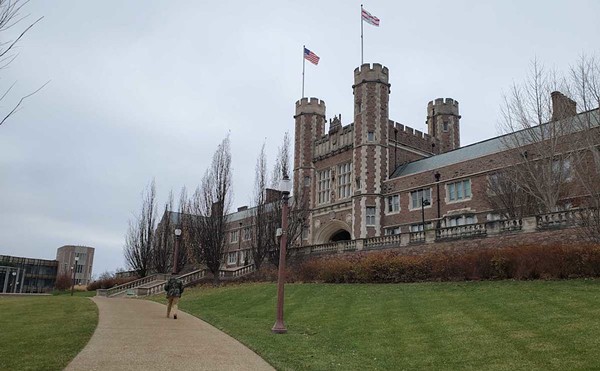Well, so much for the status quo. Last month at Bank One Ballpark in Phoenix, Diamondbacks owner Jerry Colangelo hosted a press conference to kick off Battin' 1000, a campaign that aims to raise at least $1 million to construct a pro-life education center for the American Life League near the anti-abortion organization's Stafford, Virginia, headquarters. A prominent source of the campaign's funding and fundraising clout: major-league baseball players. Battin' 1000's chairman, former Oakland A's third baseman Sal Bando, says the cause has been endorsed by 90 current and former players, managers and owners (Hall of Famers Robin Yount, Gary Carter and Tommy Lasorda among them). Contributors also include Cardinals battery mates Woody Williams and Mike Matheny, as well as former second baseman Tom Herr, third baseman Terry Pendleton and pitcher Ken Dayley. (Each donor pledges a minimum of $1,000; hence the group's name.)
"This is certainly not the sort of philanthropic action that we see," says Hadley Morash, executive director of the Boston-based MVPhilanthropy, which counsels athletes on setting up foundations and choosing causes to lend their names to. "Much more often, it's geared toward working with youth, making sure kids below the poverty line have food and resources. We see a lot of athletes who work with disease issues -- cancer. The Dikembe Mutombo Foundation works in Congo to build hospitals over there."
Morash says athletes tend to give according to their own life experiences. "It's not the norm that we see support for something so politically polarizing as this," she adds. "You're going to gain a lot of support on half your fanbase and lose a lot of support on the other half."
Mark Pollick, founder and president of the Giving Back Fund, another Boston-based nonprofit that advises athletes off the field, concurs. "If they have agents worth their salt, they're going to tell them not to touch this with a ten-foot pole," says Pollick. "It's going to affect their future marketing."
"I agree that it's unusual," ventures NBC sports broadcaster and St. Louis resident Bob Costas, who also chairs the board of Pollick's nonprofit. "When people ask, as they often do, 'Why aren't athletes more socially conscious?' [the question is] most often asked about progressive social initiatives." As an example, Costas cites Tiger Woods' involuntary insertion into the recent flap involving the Augusta National Golf Club, host of the annual Masters golf tournament. "It has to cut both ways," the broadcaster asserts.
Of course, abortion is arguably a more polarizing issue than, say, a woman's right to join a golf club. And even at that, star athletes are hesitant to jump into the fray, as evidenced by Woods' initial neutrality on Augusta National's male-only membership.
Such cautious approaches haven't always been the norm, Costas notes, mentioning Muhammad Ali's opposition to the Vietnam War as a classic example of gutsy activism by an athlete. And Costas argues that as long as players such as Williams and Matheny -- who rank among the Cardinals' most committed philanthropists when it comes to more mainstream charities -- are consistent in the causes they champion, it shouldn't matter which side of the issue they're on. "I think these guys' viability is based on performance on the field," the broadcaster says, without divulging his personal stance on the abortion issue. "With all due respect to Woody and Mike, these guys aren't big endorsers. It'd be different if you were talking about the fifteen or twenty athletes who have national recognition."
St. Louis-based agent Bob Lattinville, whose firm has done work for former Cardinals Mark McGwire, Ozzie Smith and Willie McGee, agrees that the higher the athlete's profile, the trickier the issue becomes. "I tell players I represent to keep their public life as innocuous as possible," Lattinville says, though he adds that sometimes players do whatever they please without telling their agent or employer in advance. "From a technical standpoint, they have a right to [take controversial stances], but my biggest thought would be in terms of endorsement opportunities. I wouldn't have one of my guys do it, that's for damn sure."
"What's at stake for them? It's not like they're going to lose their jobs," counters Tom Herr, who in the 1980s founded a group called Athletes for Life, which produced television public-service announcements on behalf of abstinence and sexual chastity but stopped short of tackling abortion in so public a manner. "It's a belief, and, fortunately, we live in a country where individuals can express their beliefs. I admire those guys for taking their stance. It's not easy to be in the public eye and position yourself."
Williams' and Matheny's agents say that until they were contacted for this story, they knew nothing about Battin' 1000 and were unaware that their clients were affiliated with the pro-life cause. John Boggs, Matheny's agent, says that what an athlete does with his time and money off the field is his own business. Matheny, Boggs says, wouldn't likely be deterred from any cause, regardless of his stature in the league. "The Mike Matheny I know, if it was something he firmly believes in, I think he'd make a stand. Mike is an individual who has strong beliefs. He's gonna do what he believes without any concern for the economic marketplace."
Battin' 1000 chair Bando feels much the same way. "I think if you believe strongly enough in something, political ramifications are unimportant," Bando argues, although he concedes that some of the athletes involved in the Battin' 1000 campaign might not understand the hard-line extent of the Virginia-based organization's philosophies, which are rooted in Catholicism and, according to the group's literature, "absolute Truth."
"Many of the players are probably unaware of the stances of ALL," Bando acknowledges. "What they are aware of is right-to-life. We probably have some differences on specifics. My prayer would be that if a woman were pregnant through rape or incest that she would deliver the baby. But I do understand the dilemma."
Paula Gianino, president and CEO of Planned Parenthood of the St. Louis Region, was livid when informed about the athletes' anti-abortion activism. "It's America -- it's baseball," protests Gianino. "To try and bring into it a divisive but deeply personal subject is manipulative."
So Planned Parenthood wouldn't invite pro baseball players to work toward building a pro-choice education center in St. Louis? "We might," Gianino hedges. "I don't fault them [ALL] for doing that." But there's a critical difference, Gianino insists: "Abortion is legal in this country," she argues. "Their primary purpose is to take away women's reproductive freedom."
Although tennis stars Billie Jean King and Martina Navratilova have pitched in on its behalf, Planned Parenthood typically relies on artists and entertainment-industry stars to further its agenda -- from Maya Angelou to Christina Ricci, Spike Lee and Sheryl Crow. If Williams, Matheny and their Battin' 1000 roster mates make good on their goal, it could set up an interesting showdown between athletes and actors.
Or, as Sal Bando sees it, they might just agree to disagree -- with American's fixation on sport and celebrity trumping all other considerations. Noting Hollywood's current anti-war activism, Bando observes: "I agree with President Bush: I see a lot of these entertainers that I disagree with personally, but I'll probably still see their movies."





